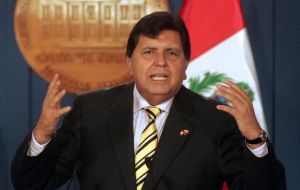MercoPress. South Atlantic News Agency
Peru begins to discuss political reform to make Congress more accountable
 Alan García wants poverty down to 30% of Peruvians by July 2011
Alan García wants poverty down to 30% of Peruvians by July 2011 Peruvian president Alan García said he had no intention of perpetuating in office but openly supported the proposal to have the one house Congress renewed by halves, “so people in mid term can decide if lawmakers are making a good job or not, as happens in most developed presidential countries”.
García, 60, who was first elected in 1985 for a five year period, and later in 2005 underlined that once he concluded his term in office on 28 July 2011, he simply will return home as one more Peruvian citizen.
“On supporting political reform I only want to see a more efficient democracy in Peru. In advanced countries, at mid term the electorate decides whether a good job is being done, and so political parties have to behave, be accountable, deliver act responsibly: no more ‘I’m in for five years, I’ll do what pleases me’”, said President Garcia.
The Peruvian president said the reforms will generate a more democratic system with greater participation from the people in politics, “which means I will be supporting the project that is scheduled to begin to be discussed by Congress in early January”.
“We will be giving the people a powerful instrument: if the ruling party does not please you, vote for change and this will also influence ministers and the cabinet to do their best and remind them they will keep their jobs if they are efficient and deliver. We want an accountable congress and ministers”, said García.
“There’s no second intention behind these reforms, I believe in democracy and I will definitively be leaving 28 July 2011, but I want to leave behind a better democracy”.
García also brushed aside criticisms about his new Finance minister, economist Mercedes Araoz, (48), “the first woman in the country’s history to hold that post”.
“They are discriminatory reactions because Ms Araoz is a woman. She has been in my administration since we started in 2006, as Minister of Foreign Trade and Tourism and later as Production minister, and has done excellent jobs” said Garcia.
She replaces Luis Carranza a close aide of Garcia who accepted the job but only for one year during the global downturn.
“In spite of the global crisis, the Peruvian GDP will be expanding one percent this year”, pointed out Garcia who praised Carranza’s performance.
The Peruvian president said that the incoming minister’s task won’t be easy “but I trust she will deliver: by the time my term is over in 2011 poverty must be down to 30% of the population”. (Half the population figure as poor in World Bank reports).
Garcia said that the Peruvian budget was balanced, essential for political stability “and has earned us international credibility and allowed us to implement serious and effective social policies to help the needy and vulnerable”.
He strongly denied his administration was preparing to spend lavishly in support of the coming municipal and regional elections in 2010, and the 2011 presidential and legislative vote.
“My commitment has been and will continue to be that Peru consolidates as a serious, responsible and reliable country”.




Top Comments
Disclaimer & comment rules-

-

Read all commentsHow will voting be organized in the areas where people barely survive from one day to the other ?
Dec 27th, 2009 - 01:13 am 0And how will the Quechua and Aymara people vote ?
How will voting be organized in the areas where people barely survive from one day to the other ?
Dec 27th, 2009 - 05:29 am 0The people who barely survive can organize that on their own way, so long it's done by the law in Peru. So long you give them a voice, they will vote for the individuals who work for them and vote clowns out who do not work for them.
how will the Quechua and Aymara people vote ?
Do they care about National politics? they care more about their pueblo than what's happening in Lima.
Commenting for this story is now closed.
If you have a Facebook account, become a fan and comment on our Facebook Page!